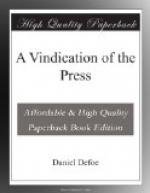It is no surprise to find the author of A Vindication, in discussing the qualifications of writers, advocating the importance of genius and “Natural Parts” above mere learning. He instances the author of The True-Born Englishman and Shakespeare, the former “Characteriz’d as a Person of Little Learning, but of prodigious Natural Parts” and the latter having “but a small share of Literature.” The further example of the literary achievements of the “Fair Sex,” who had, of course, no university education, reminds one of Defoe’s championship elsewhere of women. The business of a writer is “to please and inform,” and the general implication is that genius is more necessary to this end than learning.
Also characteristic of Defoe is his emphasis upon the advantage to an author of conversation, “the Aliment of Genius, the Life of all airy Performances” [p.32]. Likewise, his digression upon education [pp. 34f.], his charge that people of quality in England all too often neglect their children’s education, his remarks upon the advantages of travel and the need of training in the vernacular, all will be familiar to readers of Defoe.
A Vindication of the Press is chiefly important for the corroboration of our knowledge of Daniel Defoe. It presents nothing that is new, but it gives further evidence of his pride in authorship, of his rationalization of his actions as a professional journalist, and of his belief in the importance of a free press. Many of his characteristic ideas are repeated with his usual consistency in point of view. Although the critical comments in the essay are thoroughly conventional, they offer evidence of contemporary literary judgments and reveal Defoe as a well-informed man of moderation and commonsense, though certainly not as a profound critic. In the catholicity of his tastes and interests Defoe is far ahead of his Puritan fellows, and his essay may be taken as one indication of the growing interest of the middle-classes for whom he wrote in the greater world of literature. As Professor Trent remarks in his ms. notes, “Defoe rarely wrote a tract without introducing something worthy of attention and comment, and the present pamphlet is no exception to the rule.”
I should like to thank Dr. Henry C. Hutchins for his generosity in making available to me Professor Trent’s ms. notes on A Vindication and Dr. John Robert Moore for his kindness, criticisms, and suggestions.
Otho Clinton Williams San Jose State College
Vindication of the Press:
OR, AN ESSAY ON THE Usefulness of Writing, ON CRITICISM, AND THE
Qualification of AUTHORS.
Wherein is shewn,
That ’tis for the Advantage of all Governments to encourage Writing; otherwise a Nation would never be secure from the Attempts of its most secret Enemies; Barbarous and prejudic’d Criticisms on Writings are detected, and Criticism is justly stated. With an Examination into what Genius’s and Learning are necessary for an AUTHOR in all manner of Performances.




